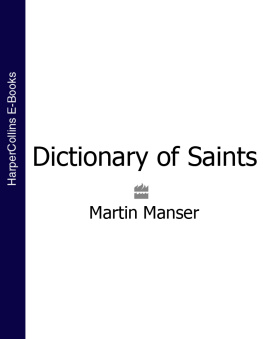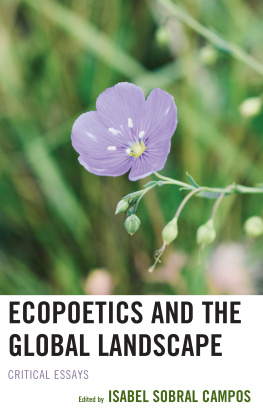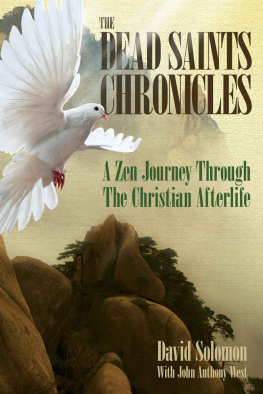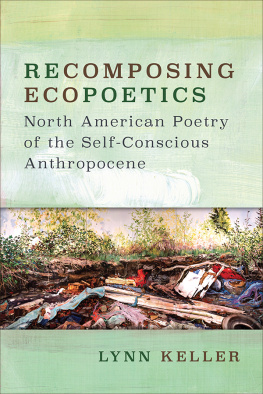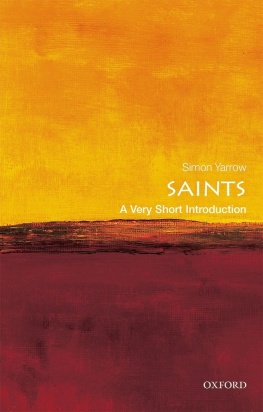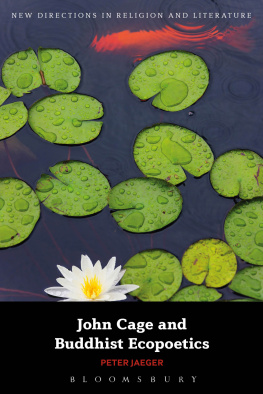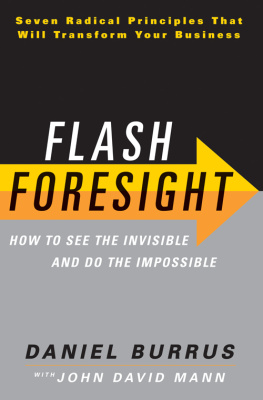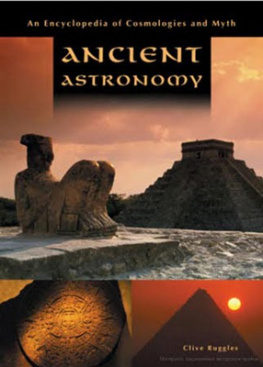Virginia Burrus - Ancient Christian Ecopoetics: Cosmologies, Saints, Things
Here you can read online Virginia Burrus - Ancient Christian Ecopoetics: Cosmologies, Saints, Things full text of the book (entire story) in english for free. Download pdf and epub, get meaning, cover and reviews about this ebook. year: 2018, publisher: University of Pennsylvania Press, genre: Religion. Description of the work, (preface) as well as reviews are available. Best literature library LitArk.com created for fans of good reading and offers a wide selection of genres:
Romance novel
Science fiction
Adventure
Detective
Science
History
Home and family
Prose
Art
Politics
Computer
Non-fiction
Religion
Business
Children
Humor
Choose a favorite category and find really read worthwhile books. Enjoy immersion in the world of imagination, feel the emotions of the characters or learn something new for yourself, make an fascinating discovery.

- Book:Ancient Christian Ecopoetics: Cosmologies, Saints, Things
- Author:
- Publisher:University of Pennsylvania Press
- Genre:
- Year:2018
- Rating:5 / 5
- Favourites:Add to favourites
- Your mark:
- 100
- 1
- 2
- 3
- 4
- 5
Ancient Christian Ecopoetics: Cosmologies, Saints, Things: summary, description and annotation
We offer to read an annotation, description, summary or preface (depends on what the author of the book "Ancient Christian Ecopoetics: Cosmologies, Saints, Things" wrote himself). If you haven't found the necessary information about the book — write in the comments, we will try to find it.
Ancient Christian Ecopoetics: Cosmologies, Saints, Things — read online for free the complete book (whole text) full work
Below is the text of the book, divided by pages. System saving the place of the last page read, allows you to conveniently read the book "Ancient Christian Ecopoetics: Cosmologies, Saints, Things" online for free, without having to search again every time where you left off. Put a bookmark, and you can go to the page where you finished reading at any time.
Font size:
Interval:
Bookmark:
Ancient Christian Ecopoetics
DIVINATIONS: REREADING LATE ANCIENT RELIGION
Series Editors: Daniel Boyarin, Virginia Burrus, Derek Krueger
A complete list of books in the series is available from the publisher.

COSMOLOGIES, SAINTS, THINGS
VIRGINIA BURRUS

Copyright 2019 University of Pennsylvania Press
All rights reserved. Except for brief quotations used for purposes of review or scholarly citation, none of this book may be reproduced in any form by any means without written permission from the publisher.
Published by
University of Pennsylvania Press
Philadelphia, Pennsylvania 19104-4112
www.upenn.edu/pennpress
Printed in the United States of America
on acid-free paper
1 3 5 7 9 10 8 6 4 2
Library of Congress Cataloging-in-Publication Data
Names: Burrus, Virginia, author.
Title: Ancient Christian ecopoetics: cosmologies, saints, things / Virginia Burrus.
Other titles: Divinations.
Description: 1st edition. | Philadelphia: University of Pennsylvania Press, [2019] | Series: Divinations: rereading late ancient religion | Includes bibliographical references and index.
Identifiers: LCCN 2018015361 | ISBN 9780812250794 (hardcover: alk. paper)
Subjects: LCSH: EcologyReligious aspectsChristianity. | Church historyPrimitive and early church, ca. 30-600. | Cosmology, Ancient. | Christian hagiographyHistoryTo 1500. | Material cultureReligious aspects.
Classification: LCC BT695.5 .B855 2018 | DDC 230/.13dc23
LC record available at https://lccn.loc.gov/2018015361
For Catherine and Sharon,
beloved sister-friends,
without whom this book would have been unthinkable


We are only just beginning to think the ecological thought. Perhaps there is no end to its thinking.
Timothy Morton
What does it mean to think the ecological thought? For Timothy Morton and a host of other ecologically minded theorists, it entails attentiveness to the interconnection and the liveliness and agency of all beings. If some of us are just beginning to think this thought, this is because we are just beginning to comprehend the consequences of the failure to do so. Having believed ourselves masters of nature, we now learn the painful lessons of dependence and vulnerability. Ecological thought comes belatedly then. It arrives only when it is too late to undo the planetary damage. Yet thinking it matters more than ever. It is also more than ever within our grasp. Indeed, crisis births revelation, and apparent end times may turn out to offer the first glimmerings of new times.
Ecological thought propels us forward toward a future as yet barely imaginable. Paradoxically, it may also draw us back to a past only dimly recalled. What draws us, however, is not the longing for a simpler, purer time and place. Even if such existed, it would be of little help to us now. Rather, the pursuit of a usable past here evokes a context as complex and in its own way as compromised as our ownnamely, the late ancient Mediterranean. The cultural artifacts of Christianity in particular claim our attention. What might they have to say to us anthropoceneswe who have outlived our innocence, no longer able to imagine our planet impervious to destructive human habit?
To some, this question may seem odd or forced. Why should we expect ancient Christian theologies, stories, images, or practices to speak to ecological crisis, or indeed to any of the other urgencies of our own moment? Why should we even want them to? As Christopher Schliephake notes in his
Thus my question about the possible relevance of ancient Christianity to current ecological thought has a larger context and a longer history. One starting point is medieval historian Lynn Whites 1967 essay The Historical Roots of Our Ecological Crisis. Invoking the histories of technology, science, politics, culture, and religion, Whites claims in this five-page manifesto are bold and multifaceted. Three in particular have incited discussion and debate in the half-century since the article was published, as Todd LeVasseur and Anna Peterson observe in a volume dedicated to reflection on that fifty-year marker.
All three of these claims have been vigorously contested, yet none has been simply discarded. First, how people think about the world around themwhether we call it worldview, cosmology, theology, or ideologyis not the only factor affecting their behavior toward that more-than-human universe, most would agree. It may not even be the most important factor much of the time. As Willis Jenkins points out, The ethicist might entertain the converse to Whites thesis: why not hold that cosmology (what they think about themselves in relation to the things around them) is produced by social practice (what people do about their ecology)? If that were the case, it would shift the ethical task away from transforming cosmology and toward transforming social practices.
Second, Whites view of Christianity strikes many as troublingly monolithic and essentializing. At the same time, his critique of a Western Christianity crystallized in the European Middle Ages may seem too narrowly targeted, and his consequent idealizing of Eastern Christianity and Asian religions has opened him to the charge of a romanticizing orientalism. Nonetheless, his particular criticisms of Christianity, however much painted in broad strokes, have largely stuck. Christianitys anthropocentrism, its eschatologically refracted dualism, and its theology of dominion have often hindered rather than enhanced ecologically sensitive thought and action.
Thus this book situates itself in the trajectory of a now wide-ranging engagement of the fields of religion and ecology that can be seen, at least with hindsight, to have begun with Lynn Whites essay. As Whitney Bauman argues, the story could also be told differently: The White narrative can stand side by side with other narratives that connect that planet in a whole field of intersectional discourses that are working toward a different, more ecologically sound and just planetary future. I want to resist the temptation to look for either a culprit or a savior in Christianity, in other words.
Ancient Christianity continues to be deemed normative or authoritative for Christians worldwide, and thus many tend to discover their own image in its thought, literature, and art. It may therefore seem an unlikely place to discover the emergence of the new. Yet the world of the so-called Church Fathers is surely far stranger than we tend to imagine. I want to explore the strangeness of ancient Christianity, allowing myself to be inspired, startled, or coaxed by its alien character. Here at the beginning, let me name a few basic facets of that strangeness, as I perceive it.
First, the boundaries between Christianity and what we ourselves might think of as its religious others were not always as evident to denizens of the ancient Mediterranean as they are to us. This ancient ecopoetics is all the more Christian because it is also Jewish and Platonic and polytheistic.
Second, ancient Christianity did not yet know itself as Protestant or Catholic or Orthodox, or even as Western or Eastern. Its differentiationsits competing orthodoxies and heresieswere less trenchantly institutionalized and acculturated, more fluid and dynamic (if often no less violent) in their ongoing negotiations than such labels might imply. This ancient ecopoetics leaves the definition of what is properly Christian open.
Next pageFont size:
Interval:
Bookmark:
Similar books «Ancient Christian Ecopoetics: Cosmologies, Saints, Things»
Look at similar books to Ancient Christian Ecopoetics: Cosmologies, Saints, Things. We have selected literature similar in name and meaning in the hope of providing readers with more options to find new, interesting, not yet read works.
Discussion, reviews of the book Ancient Christian Ecopoetics: Cosmologies, Saints, Things and just readers' own opinions. Leave your comments, write what you think about the work, its meaning or the main characters. Specify what exactly you liked and what you didn't like, and why you think so.

